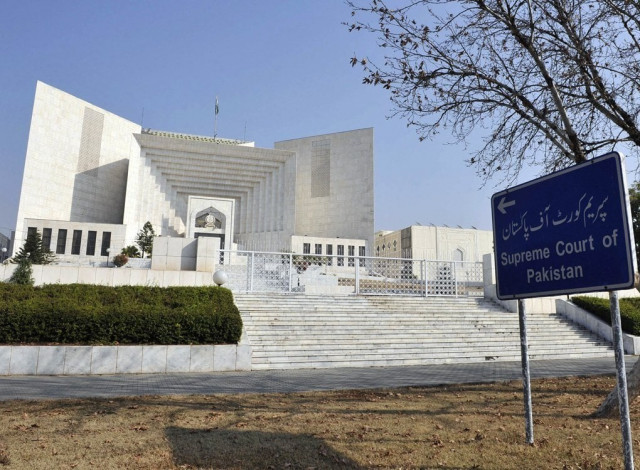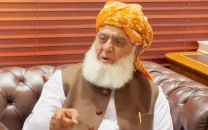SC moved against lifetime disqualification of lawmakers under Article 62
SCBA says constitutional provision doesn’t entail a perpetual bar

The Supreme Court Bar Association (SCBA) has challenged the lifetime disqualification of lawmakers under Article 62 (1)(f) of the Constitution, pleading to the apex court that the constitutional provision did not entail a perpetual bar.
The petition filed by SCBA President Ahsan Bhoon contended that the disqualification under Article 62 (1)(f) should be applied in cases of an election dispute. It added that the Supreme Court (SC) could not proceed as a trial court under the powers of Article 184(3).
In 2018, a five-judge Supreme Court bench unanimously held that disqualification handed down under Article 62-1(f) of the Constitution is for life.
Article 62(1)(f), which sets the precondition for a member of parliament to be "sadiq and ameen" (honest and righteous), is the same provision under which former prime minister Nawaz Sharif was disqualified by a five-judge SC bench on July 28, 2017, in the Panama Papers case. Similarly, Pakistan Tehreek-i-Insaf (PTI) leader Jahangir Tareen was disqualified by a separate bench of the apex court under the same provision.
Read more: SCBA chief opposes life-long disqualification under Article 62(1)f
The SCBA petition has requested the top court to declare that the proceedings and declarations under Articles 184(3) or 199 of the Constitution did not constitute declarations by a court of law, as per the principles expounded by it.
“The apex court, while acting pursuant to Article 184(3) of the Constitution, “exercises extraordinary and original constitutional jurisdiction,” the petition said, adding that it did not act as a trial court where the person “is afforded the right to lead evidence, produce witnesses, and cross-examine the other side’s witnesses and so on”.
It also stated that in addition to the failure to provide an opportunity for cross-examination, proceedings under Article 184(3) were “additionally violative of the principles of due process” and the right to a fair trial, as they precluded the possibility of any kind of appeal.
“While it may indeed be true that the legislature did not envisage an appeal in proceedings under Article 184(3), this Honourable Court’s judgments on the nature of a court under Article 62(1)(f), and the resultant jurisprudence that has been established since, requires harmonisation,” the petition said.
“More specifically, if the legislature intended that a court under Article 62(1)(f) provide a fair opportunity of vindication to a person, and also that proceedings under Article 184(3) be conducted sans the right to an appeal, then the two cannot be reconciled in a single case and at the same forum,” it added.
Political implications
Earlier, the superior courts had shown restraint in disqualifying lawmakers for more than two decades. However, soon after his restoration in March 2009, former chief justice Iftikhar Muhammad Chaudhry enforced Article 62 and Article 63, disqualifying lawmakers by exercising suo motu jurisdiction.
Dozens of lawmakers were disqualified under the articles by the superior courts for having fake degrees, dual nationalities and concealment of assets.
In 2018, then chief justice Saqib Nisar had constituted a five-judge larger bench led by himself to examine whether or not the disqualification under Article 62(1)(f) of the Constitution was for life.
The Supreme Court had held that if it declared that a lawmaker was not ‘Sadiq’ and ‘Ameen’ [truthful and trustworthy] under the article, then he or she would be permanently disqualified from contesting the elections.
The Supreme Court had also rejected the contentions of (late) Asma Jahangir, Sakindar Bashir Mohmand, Sardar Aslam, Kamran Murtaza, who were opposing the lifelong disqualification.
Justice Umar Ata Bandial had authored a 52-page ruling that justified the permanent disqualification of the parliamentarians under the constitutional provision. Instead of referring the matter to parliament to take a final decision on the time duration of disqualification, the court comprehensively discussed the importance of Article 62(1)(f).
The verdict said that Article 62(1)(f) of the constitution imposed Islamic ethical conditions for eligibility of a candidate for the election to parliament but these were made applicable to both Muslim as well as non-Muslim candidates for parliamentary membership.
The court also reproduced the current code of conduct of the members of the United Kingdom to assert the conditions of eligibility. It also said that the same constitutional provision was endorsed by the 18th Amendment, wherein several adjustments were made that if the declaration by the court had attained finality, the embargo under Article 62(1)(f) of the Constitution acquired permanent effect.
“A court of law does not issue a declaration that offends mere sentiments or sensibilities. Consequently, a valid declaration by the court would involve the breach of a legal duty or obligation owed by the candidate for election to another person or the violation of the latter’s legal right or privilege.”
Justifying lifetime disqualification, Justice Bandial further said that a candidate for election, who had committed misconduct falling within the terms of Article 62(1)(f) of the Constitution, had on the Islamic and also universal criteria of honesty, integrity and probity, rendered himself unfit to hold public office.
However, the verdict has been criticised by senior lawyers on several grounds, including the very nature of the bench that passed the landmark ruling.
The legal eagles raised objections that out of five, four judges – Saqib Nisar, Azmat Saeed Sheikh, Umar Ata Bandial and Ijaz ul Ahsan – of the bench belonged to Punjab.
Justice Sajjad Ali Shah, who belongs to Sindh, was also part of that larger bench. Interestingly, most of these judges were part of benches that issued rulings in high-profile cases.
Legal experts believe that such matters should either be fixed before a full-court or if the CJP constitutes larger benches, proper representation of each province should be ensured to remove any negative perception.
Also read: SCBA set to challenge lifetime disqualification of MPs
They also say that a larger bench, comprising the senior-most judges, should hear the SCBA petition in this regard. Some senior lawyers point out several inconsistencies in matters, which were adjudicated under Article 62(1)(f).
Interestingly, a murderer can contest elections after a specific time, but a lawmaker, who lies under oath, has been barred permanently, they say.
In October 2018, the apex court in the Khawaja Asif case finally laid down an ‘objective criterion to test the honesty of a lawmaker by declaring that Article 62(1)(f) could not be applied to every omission or non-disclosure of assets.
Later, the court set aside the lifetime disqualification of Pakistan Tehreek-e-Insaf (PTI) Balochistan chief Yar Muhammad Rind in the fake degree case, declaring that such disqualifications must be based on oral or documentary evidence and not presumptions.
In May, the apex court reiterated that it was now a well-settled principle that every non-disclosure or misdeclaration would not be sufficient enough to permanently disqualify a member of parliament or a candidate under Article 62 (1) (f).
“The purpose and intention need to be seen behind the non-disclosure or misdeclaration. The returned candidate would be disqualified only when if he/she has dishonestly acquired assets and is hiding them to derive certain benefits,” an 11-page judgment authored by Justice Sayyed Mazahar Ali Akbar Naqvi stated.
The verdict was issued on a petition filed by a politician, Shamona Badshah Qaisarani, who was disqualified for a lifetime over non-disclosure of her agricultural property inherited from her parents in the nomination papers.
The court said that it was the credibility of the explanation that would be the determining factor as to whether non-disclosure of an asset carries with it the element of dishonesty or not.
In view of the latest judgment, several lawyers contend that Tareen could not be disqualified for life.
Justice Qazi Faez Isa had also posed seven questions to determine the eligibility criteria of lawmakers.



















COMMENTS
Comments are moderated and generally will be posted if they are on-topic and not abusive.
For more information, please see our Comments FAQ